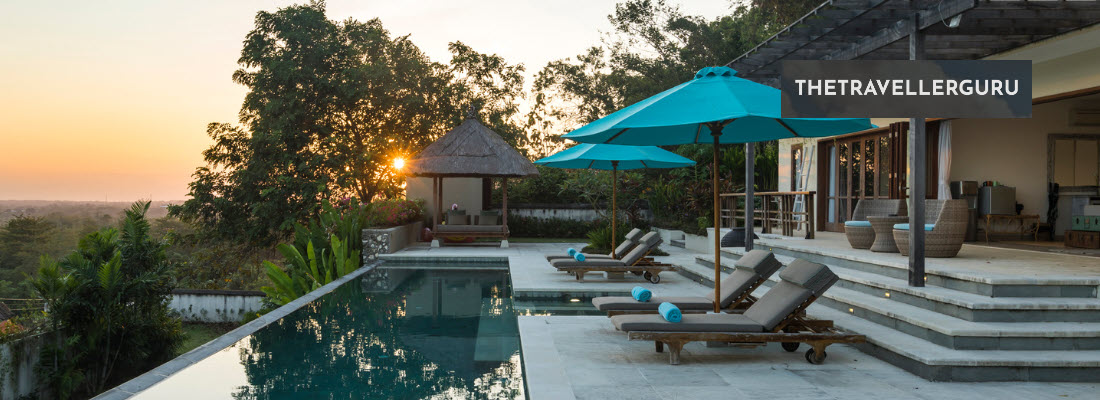Hello, there travel enthusiasts and welcome to my post where I we will check out my views on whether you should stay in a hotel or villa. Now before we start, I could save you some time and say that both are good and it basically depends on how much time you plan to spend there.
I mean why pay for a full villa when you are only going to sleep there at night? Alternatively, a hotel room can get pretty cramped pretty quick with a couple of kids in there for any length of time.
Hotel or Villa
The old hotel vs villa debate is one that pops up a lot in my household as the holiday plans begin – especially if we are going somewhere known for their villas such as Bali or Thailand. Let’s break them both down below:
Hotels

It could be argued that hotels are the traditional go-to choice for travelers worldwide offering a multitude of conveniences and services. From cozy boutique hotels to grand luxury establishments, hotels promise a standardized experience coupled with professional hospitality with an array of options catering to various preferences and budgets.
Depending on the price and star rating of the establishment, a typical hotel room generally includes a bed (or beds) and may also feature a bedside table or nightstand equipped with a lamp and alarm clock. Additionally, a hotel room usually offers a seating area comprising a desk or table, chairs or a sofa and a television for relaxation and entertainment. Other amenities commonly found in hotel rooms include a wardrobe or closet for storing personal belongings, a mini-fridge or minibar for refreshments and a safe for secure storage of valuables.
Furthermore, hotel rooms typically incorporate a private bathroom, equipped with a toilet, sink and either a shower or a bathtub with towels, toiletries and a hairdryer often provided as well. Depending on the hotel’s category and level of luxury, additional features such as a coffee maker, ironing facilities a telephone or a mini-kitchenette with basic cooking appliances may be available.
Within the confines of the hotel, you may also expect features such as concierge services, in-room dining (room service), fitness centers and swimming pools.
Check out my post: Hotel Vs Airbnb
Hotel Pros and Cons
Pros of hotels:
- Convenience and Accessibility: Hotels are often conveniently located in popular tourist areas or near key attractions, making it easy to explore the destination. They are also generally well-connected to transportation networks as well with easy access to public transportation, airports and major landmarks.
- Professional Service: Hotels have a well-trained staff from concierge services to housekeeping and room service offering convenience and assistance around the clock. Staff members can provide local recommendations, arrange tours and handle any inquiries or issues that may arise during your stay.
- Wide Range of Amenities: Hotels boast a wide array of amenities to cater to various needs and preferences. These may include on-site restaurants, bars, spas, fitness centers, swimming pools, business centers and conference facilities. Such amenities can enhance your overall experience and offer convenience without needing to leave the premises.
- Security and Safety: Hotels prioritize guest safety and often have 24/7 security personnel, surveillance systems and secure access to rooms. This can provide peace of mind, particularly for solo travelers or those concerned about safety in unfamiliar surroundings.
- Social Opportunities: Hotels often offer communal spaces such as lobbies, bars and lounges providing opportunities to meet and interact with fellow travelers. This can be advantageous for solo travelers seeking social engagement or networking possibilities.

Cons of hotels:
- Lack of Privacy: In hotels, you are typically surrounded by other guests, resulting in a potentially noisy environment and limited privacy. Shared spaces such as lobbies, elevators and corridors may be bustling which could detract from a sense of exclusivity and tranquility.
- Limited Space: Hotel rooms are generally smaller than villas, offering limited space for relaxation, storage or entertaining guests. This can be a disadvantage, particularly for families or those seeking more extensive living areas.
- Less Personalized Experience: Due to the large number of guests, hotels may struggle to provide personalized attention to each individual. The standardized nature of hotels can sometimes make the experience feel less tailored to specific preferences and needs.
- Extra Costs: While hotels offer various amenities, some of them may come with additional charges. Services like parking, Wi-Fi, spa treatments or breakfast may be offered at an extra cost, increasing your overall expenses.
- Limited Kitchen Facilities: Hotel rooms usually do not include kitchen facilities, limiting your ability to cook your own meals. This may result in a reliance on dining out or ordering room service, which can be less cost-effective and restrict dietary preferences.
Villas

Villas offer an entirely different concept of accommodation, emphasizing privacy, exclusivity and a more intimate connection with your surroundings. A villa is a type of luxurious accommodation that typically refers to a standalone house or a large residence located in a scenic or resort-like setting. Unlike hotel rooms, villas provide a more spacious and private retreat, often favored by families, groups of friends or individuals seeking a high level of comfort and exclusivity during their vacation or extended stay.
A villa typically includes multiple bedrooms allowing guests to have their private sleeping quarters and may feature comfortable beds, and ample storage spaces such as closets or wardrobes. Additionally, villas commonly include spacious living areas, including a lounge or a living room furnished with sofas, chairs and tables, providing ample space for relaxation and socializing.
Furthermore, villas often feature a fully equipped kitchen or kitchenette, allowing guests to prepare their meals at their convenience. The kitchen may include appliances such as a stove, oven, refrigerator, microwave and dishwasher, along with cookware, utensils, and dining sets. This feature is particularly beneficial for those who prefer self-catering or wish to have the flexibility of cooking their own meals while staying in the villa.
And finally many also offer outdoor amenities such as a private garden, patio or terrace and most feature a private swimming pool, a hot tub, a barbecue area. Larger resort style options may also provide access to sports facilities such as tennis courts or golf courses as well.
Villa Pros and Cons
Pros of Villas:
- Privacy and Exclusivity: Villas provide a high level of privacy, allowing you to enjoy a secluded retreat away from the crowds. With no shared spaces, you can relish personal space whether it’s your private pool, garden, or terrace. This exclusivity creates an intimate atmosphere ideal for romantic getaways, family gatherings or peaceful relaxation.
- Spaciousness and Comfort: Villas typically offer more space compared to hotel rooms, providing ample room for relaxation, socializing and entertainment. Multiple bedrooms, living areas, dining spaces and fully equipped kitchens contribute to a home-like ambiance, offering comfort and convenience during your stay.
- Personalized Services: Many villas provide personalized services tailored to your specific needs and preferences. From dedicated villa managers and private chefs to the housekeeping staff, you can enjoy a higher level of personalized attention and assistance.
- Flexibility and Freedom: Villas offer greater flexibility and freedom in terms of scheduling and activities. You have the liberty to create your itinerary, dine at your preferred time and enjoy leisure activities without the constraints of hotel policies or schedules.
- Home-like Atmosphere: Staying in a villa often provides a sense of being at home in a foreign place. The ambiance is more intimate and homely, fostering a cozy and comfortable environment. This can enhance relaxation and create a connection with the local culture, especially when villas are designed with local architectural styles and decor.

Cons of Villa:
- Location and Accessibility: Villas are often located in residential areas or more secluded locations, which may require transportation to reach tourist attractions or amenities. If you prefer being in the heart of the action or having immediate access to restaurants, shops, and entertainment, a villa’s location might be less convenient.
- Limited On-site Amenities: While some villas offer a range of amenities such as private pools, gardens or fitness facilities, they might not match the extensive amenities provided by hotels. Facilities such as restaurants, bars or spa services may not be available on-site, requiring you to venture out for such experiences.
- Self-Catering Challenges: Villas typically come with kitchen facilities, allowing you to cook your meals. However, this may require more effort and planning, especially if you prefer the convenience of hotel dining or room service. Grocery shopping, meal preparation and cleaning might be additional tasks to consider during your stay.
- Higher Costs for Luxury Villas: Luxurious villas with top-notch amenities and services can be quite expensive compared to hotels. If you are on a tight budget, finding a cost-effective villa with the desired features might be challenging, making hotels a more affordable option in some cases.
- Limited Social Interaction: Unlike hotels, villas do not offer the same opportunities for socializing with other travelers. If you enjoy meeting new people or prefer a lively social atmosphere, the solitude of a villa might not be as appealing.
Villa vs Hotel: Detailed Comparison
If you are still on the fence here, let’s quickly now run through a quick comparison of the above:
Staff
When it comes to staff and services, hotels and villas provide distinct experiences. Here’s a comparison of how hotels and villas differ in this aspect:
Hotels: typically employ a team of trained and experienced staff members dedicated to providing excellent customer service. This may include includes front desk personnel, concierge staff, housekeeping teams, restaurant and bar staff. Hotels also generally offer round-the-clock assistance, ensuring that staff members are available at all times to address guest needs, inquiries, or emergencies.
Villas: tend to prioritize customized services tailored to your specific needs and preferences. They often provide dedicated villa managers who act as a point of contact and coordinate various aspects of your stay and can assist with such needs as pre-arrival arrangements, organizing activities or excursions and making restaurant reservation etc..
Services
Hotels: provide a wide range of services to enhance guests’ convenience and comfort which may include concierge services, luggage storage, laundry service, valet parking, airport transfers and business facilities. Additionally, hotels often have on-site restaurants, bars, fitness centers, swimming pools, spas, and meeting or event spaces.
Villas: some villas offer the option to have a private chef, allowing you to enjoy customized meals prepared within the villa. Most also have housekeeping staff who maintain the cleanliness of the property during your stay and upon request, can arrange additional services such as spa treatments, yoga or fitness sessions, in-villa massages, childcare services or transportation arrangements. These services are often provided by external vendors or local partners, ensuring flexibility and customization.

Security
Hotels: typically have dedicated security staff available round-the-clock to monitor the premises and ensure the safety of guests. They are trained to handle security-related issues and emergencies promptly. Many hotels also employ surveillance systems including CCTV cameras in common areas such as lobbies, hallways and parking areas as well. And of course most also have secure access systems in place requiring key cards or key codes to enter guest floors, rooms or specific areas within the hotel.
Villas: as above, Villas are often located in more secluded and private areas, providing a sense of exclusivity and minimizing external security risks. The limited access to the property contributes to enhanced privacy and security however many villas also implement security measures such as perimeter fencing, alarm systems and secure entry gates to further ensure guest safety and deter unauthorized access.
Dining
Hotels: usually feature on-site restaurants, cafes and bars offering a variety of dining options. These establishments often serve a range of cuisines and cater to different tastes and dietary preferences where you can enjoy the convenience of having dining options readily available within the hotel premises, often accessible throughout the day. Hotels also commonly provide room service, allowing you to enjoy these meals – or snacks – in the comfort of your room and many also offer buffet-style dining, especially for breakfast as well.
Villas: generally come with fully equipped kitchens, providing you with the freedom and flexibility to prepare your meals. This option is ideal for those who enjoy cooking, have specific dietary needs, or prefer a more self-sufficient approach to dining. You can explore local markets, purchase fresh ingredients and create personalized meals within the comfort of your villa. Some also offer personalized dining experiences, including the option to have a private chef as well.
Pricing
Hotels: charges are typically per room, per night and rates vary based on factors such as the hotel’s location, brand, amenities, room size and seasonality. Hotels often have different room categories available, ranging from standard rooms to suites, with corresponding price variations. Hotels frequently offer packages, promotions or loyalty programs that can provide savings or additional benefits which may include discounted rates for extended stays, bundled services (e.g., accommodation and breakfast), or special rates for specific demographics such as seniors or military personnel.
Villas: generally rented as a whole property, offering a set rate for the entire villa rather than a per-room basis. The rental cost – often priced per night or week – depends on factors such as the villa’s location, size, amenities, level of luxury and the duration of the stay. Similar to hotels, villas may have seasonal pricing where rates can vary based on the time of year and demand. Villas do however offer cost advantages for larger groups where sharing the cost of renting a villa among multiple guests can often be more affordable compared to booking multiple hotel rooms.
FAQ
What is the main difference between a hotel and a villa?
The main difference is that hotels offer individual rooms within a larger establishment, often with shared amenities and services, while villas are standalone properties that can be rented as a whole, providing exclusive use and privacy.
Which is more cost-effective, a hotel or a villa?
The cost-effectiveness depends on various factors such as the location, seasonality, group size and duration of stay. In general, hotels offer more options for different budgets, while villas can be more cost effective for larger groups or longer stays.
Do hotels provide better amenities and services than villas?
Hotels generally offer a wider range of amenities and services within the property, including on-site restaurants, bars, pools, gyms and concierge services. Villas, on the other hand, offer a more personalized experience with amenities like private pools, fully equipped kitchens and dedicated villa managers.
Conclusion
And there it is, everything you need to know as you look to choose between villas vs hotels. Of course, I would love to hear your thoughts on the subject below.
Oh, and in case you are wondering, I love a good villa if I am not in a city environment so I can relax and come and go as I please. If I am in a busy area such as a big city or major tourist area, then for pure convenience it is a hotel room all the way!
Also, please do not hesitate to comment below if you have any questions, concerns, or corrections, or would like me to check anything else out for you.
Until next time.
Have fun
Paul






